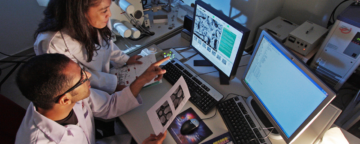Even liberals and moderates who are more likely than conservatives to be suspicious of Fox News can be influenced by a misleading article on FoxNews.com about Arctic sea ice trends, researchers found.


Even liberals and moderates who are more likely than conservatives to be suspicious of Fox News can be influenced by a misleading article on FoxNews.com about Arctic sea ice trends, researchers found.

How do science communicators most effectively present research to multiple audiences interested in different aspects of it? Such questions provided the framework of the 2016 Annenberg Lecture delivered by Marcia McNutt, president of the National Academy of Sciences.

In 2014, 35,000 walruses crowded ashore on an Alaskan beach instead of resting on ice floes. In a newly published case study, researchers studied TV news coverage of the walrus "haul-out" and people's selective exposure to it.

Pope Francis’ 2015 encyclical on the environment, “Laudato Si’,” did not rally broad public support for climate change among Catholics and non-Catholics, according to a new study from researchers at the Annenberg Public Policy Center.

An essay in Science magazine this month defends the vital importance of basic scientific research and references the work of the policy center's science communication program in advancing that message.

More than three dozen CEOs and other top executives of U.S. businesses argued that federal funding for basic scientific research is an investment in Americans’ prosperity, security and quality of life.

Dominique Brossard, from the University of Wisconsin-Madison, and William K. Hallman, from Rutgers University, have joined APPC as visiting scholars in the Science of Science Communication.

Annenberg Public Policy Center postdoctoral fellow Asheley R. Landrum will discuss her research at a workshop next month in Potsdam, Germany, on the papal encyclical on climate change.